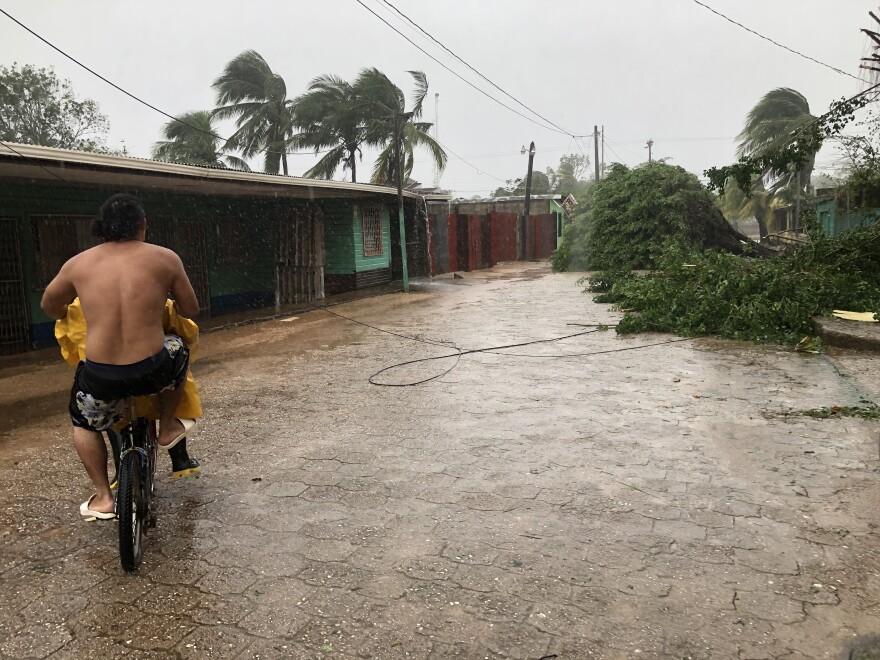Updated at 8:00 a.m. ET Wednesday
Eta was downgraded to a tropical storm overnight but continues to lash Nicaragua with strong winds and heavy rain.
The National Hurricane Center says Eta is producing potentially "life-threatening" flash flooding and landslides in parts of Central America. The storm is expected to move in to Honduras later today (Wednesday) before turning sharply to the east where it will dump more rain on parts of Guatemala and Belize. By the weekend the weather system is forecast to regain strength over the Caribbean as it heads towards Cuba and potentially Florida.
Updated at 1:10 p.m. ET
The center of Hurricane Eta, a Category 4 storm with sustained winds of 140 miles per hour, was nearing the coast of Nicaragua on Tuesday, pummeling homes and potentially bringing life-threatening flooding to Central America's Caribbean coast.
Eta was peeling off roofs, downing trees and power lines in and around Puerto Cabezas, also known as Bilwi, in Nicaragua's north, according to the country's disaster management agency, known as SINAPRED. The region of landfall is one of the country's poorest.
At an early Tuesday news conference, SINAPRED Director Guillermo González said there were reports of damage, so far, none for injuries or deaths.
As of 1 p.m. ET, the center of the storm was located about 20 miles south-southeast of Bilwi, where Hurricane Felix killed 100 people in 2007.
The U.S.-based National Hurricane Center warned that Eta, which has rapidly moved up the Saffir-Simpson scale from a Category 1 system on Monday, would batter Nicaragua with "catastrophic" winds, storm surge and flooding and possible landslides. The storm is expected to linger in the region for the remainder of the week, intensifying the flooding threat.
Forecasters said central and northern Nicaragua and much of Honduras could get 15 to 25 inches of rain, with 35 inches in some areas. Heavy rain was also expected in eastern Guatemala, southern Belize and Jamaica.
The NHC cautioned that flash flooding and river flooding might occur as far away as Haiti and the Cayman Islands. Forecasters said the Nicaraguan coast should expect storm surge up to 15 feet above normal tides.

"It was an intense night for everyone in Bilwi, Waspam and the communities along the northern coast," Yamil Zapata, local Bilwi representative of the ruling Sandinista Front, told local Channel 4 Tuesday, according to The Associated Press.
Eta is the 28th named storm of the 2020 Atlantic hurricane season, tying the record for most storms set in 2005. It is conjuring memories of Hurricane Mitch, one of the deadliest Atlantic hurricanes on record, which killed an estimated 11,000 people in Nicaragua and Honduras in 1998. Mitch, which spun up into a Category 5 hurricane, suddenly lost power before its landfall in Honduras, slowing and loitering offshore, where its intense range and storm surge took a heavy toll.
The hurricane has rapidly intensified in the past couple of days, becoming an "extremely dangerous storm" that led Nicaragua to issue a red alert warning.
"This city of 70,000 people is very vulnerable," Javier Plat, a local Catholic Priest in Puerto Cabezas, told Reuters. "We have houses made of wood and adobe, the infrastructure of the residential houses is our main vulnerability."
In Nicaragua, SINAPRED said it had evacuated some 6,000 families. Authorities also moved patients from the Nuevo Amanecer hospital in Bilwi to safe shelter, according to Today Nicaragua.
The Nicaraguan army sent troops specialized in search and rescue to the region, and the navy on Monday ferried residents from coastal islands. In neighboring Honduras, authorities also evacuated people to shelters from the outer islands and areas most vulnerable to flooding. As a precaution, El Salvador has also evacuated some of its people.
Rosario Murillo, Nicaragua's vice president and first lady, appeared on television Monday, where she prayed for divine protection. "How many hurricanes have come and we have moved on, thanks to God," she said.
Eta is forecast to push into the interior of northern Nicaragua and then hit central Honduras on Thursday, where it is expected to rapidly weaken.
Copyright 2021 NPR. To see more, visit https://www.npr.org.



